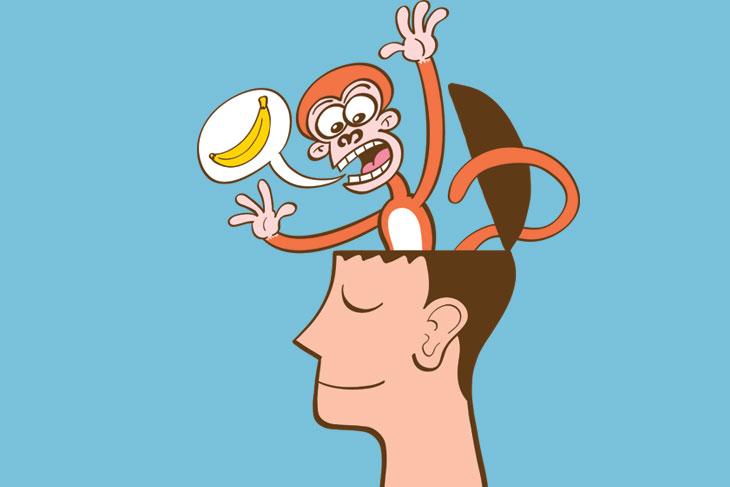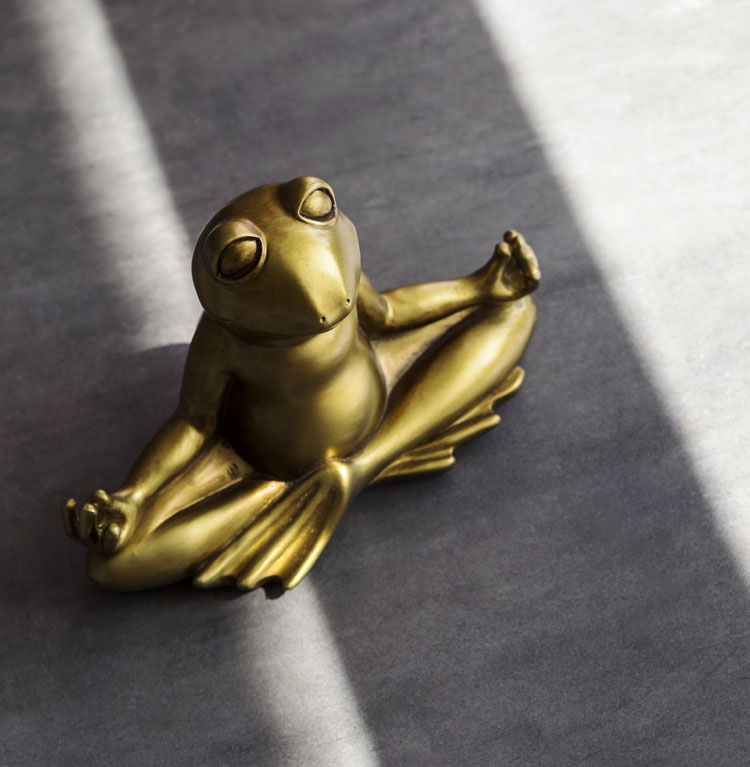‘Monkey mind’ is a term that well describes our unsettled mental state, jumping from place to place restlessly. In Buddhism, and in order to ‘tame’ the monkey, we must let go of some of those core beliefs that we hold on to about ourselves, like the idea that we need to do something right now and be active every single minute of our waking life, or that the world must meet our expectations.
If we were flung far into some tropical island, spending our days on the beach under the shade of a coconut tree holding a shake in our hand, it would probably be pretty easy to reach a state of inner peace and be tranquil. The challenge is to maintain this mental being even when the setting all around us is not at all that perfect. Real tranquility, the kind that lasts for the long run, cannot be dependent on any external condition. It has to come from within, and be our default mindset.
Of course, anyone can be shaken out of their inner peace. The question is how easily, and under what circumstances. In order to maintain inner peace for the long run, we’ll have to minimize, as much as we can, a whole range of factors that may agitate us and compromise our peace of mind. Research points at the more common dynamics that keep us tranquil, such as physical activity, nutrition, sleep, or spending time out in nature. But even if we were able to do all this on a long-term basis, these activities may come to a standstill at some point in our life, for many reasons. Injury, for example, can lead us to a total stop working out. Ask people who stopped exercising after a long time, and they’ll tell you their angle on tranquility and inner peace – most would admit to experiencing an unpleasant type of withdrawal when they had to stop.
The monkey in our head
Since inner peace is a mindset, the way to make it manifest permanently within us (well, more or less permanently), requires a direct change in our consciousness. A healthy lifestyle is undoubtedly an important factor, but its influence on our thought-patterns is indirect. Our world today poses no immediate life-threatening reality as it did in the far past, so we can only assume that most of our anxiety is rooted elsewhere, not in the reality around us but more in the way we look at this reality. If we were to objectively consider our fears, it would be apparent that the threat these fears pose is pretty marginal, and even altogether imaginative. But if tension is the outcome of the way we perceive reality, by changing our perception we can rediscover our inner peace.
In Buddhism, the term Monkey Mind describes many of us average people: we are not calm, but instead are preoccupied, capricious, confused, inconsistent. The writer Benjamin Fishel called his blog Monkey Mind, because it deals with this issue precisely – the ways to bring our monkey mind to peace. In a column he wrote for the popular website Tiny Buddha, he suggests revisiting several of the fundamental assumptions we have about ourselves and our life, and also those social conceptions we adopted from our surroundings. We have to consider how these affect us internally. Spoiler alert: he believes that abandoning these beliefs will open up a clean space for peace and tranquility to enter, and become part of who we are.
The first misconception he discusses, is the assumption that we need to be doing something right now, always, in every minute. “This is an incredibly subtle belief that most of us don’t even realize we are holding onto”, he says. The need to be constantly productive is ingrained in our minds from an early age, and it grows into an endless race as we mature, creating a lot of tension within us. Fishel says that giving-in and letting go of this sensation that there is always something that needs done will enable us to enjoy what we do. The world is full of potential, and there has always been and will forever be things to do. For eons, billions of people have not always done all that’s needed, so really, you too can calm down and release this illusionary belief that you are the only one who’s really responsibility for doing everything. One of the phenomena tightly linked to the need to be active all the time, is the illusion that if only we were to finally get our goal, we would then be able to relax and be happy. This is a big misconception, because one of the most powerful patterns in the human mind is our adaptability. Once we get used to a certain situation, its uniqueness fades away. This means, that our achievements or material assets can only be effective for the short run. Yet, understanding and accepting the fact that it is an endless race can get us out of the loop, enabling us to live without the tension it generates.

zooco / shutterstock
Another belief that we hold on to, although it can cause us much tension, is that if we express our emotions authentically it would mean we are weak. Fishel says that we undergo a process of emotional restraint because of this belief, intended to hide away our internal state for good and for worse. We fear society will condemn us if we reveal our vulnerability. “The irony in this,” he explains, “is that as everyone is dealing with the urge to be authentic, those that actually do so are often met with respect and admiration”. And they are more peaceful, for two reasons: they have one less social anxiety to deal with, and they are not suppressing a basic psychological mechanism. This greatly relates to the next belief we should free ourselves from: “If people knew the real me, they wouldn’t like it”. In truth, our emotional expression and our personal perception of who we are join forces together, to form an interface that we continuously perfect just to garner the recognition we want from society. But this choice on our part taxes us heavily – with anxiety. Self-denial is an exhausting activity, which robs us of our mental faculties. When we hide a certain aspect of our personality, we are generating inner-tension, just as the water flowing along in a river creates pressure on the riverbanks or a dam. Opening the floodgates of this dam would release the pent-up tension and let the river flow free.
Fishel describes several other beliefs of this kind, and one of these that should draw our attention is the perception that the path to real inner peace requires immense effort, and an unrealistic feat for the average person. “Many of us feel that we are far from inner peace, and we idolize those who seem to have found it”, he writes. We perceive inner peace as an exhausting journey, but “when you stop striving [for inner peace] so aggressively, you will start to see the calm you’re looking for. It is this process of turning your beliefs upside down that becomes the journey in itself.”
These changes in our perception derives from the worldview of Buddhism. Eric Barker, the Braking Up the Wrong Tree blogger, believes there’s a complementary side that can be found in Stoic philosophy. In a post linking between the two, his ideas correspond with Fishel’s, and he presents additional principles that can lead to inner peace. The major difference is Barker’s emphasis on the impact that inner peace has on our discretion and ability to make sound decision. When we are anxious, he claims, “we rarely do the smart thing”. And that’s why, when we worry, the first question we should ask ourselves is “Is this useful?”
This is classic Stoics. The ancient Greek philosophy had looked at challenges in a binary way. Whenever something disturbs our peace, we are faced with two options: there’s either something we can do about it, or it’s out of our control. If we can do something about it, the Stoics would say that there’s nothing to worry about – because we can do something about it; and if there’s nothing we can do about it, then again, there is nothing to worry about – because it’s just not up to us. Barker expands on this notion, to also explain what occurs in our brain. It’s all about “us”, he says, “not our thoughts”. While we don’t have much control over the thoughts we may have, which can suddenly rise up from our subconscious or be sparked as a reaction to an external event, the way we handle our thoughts speaks volumes about who we are. We are what we do with our thoughts – because we have the power to filter them or reject them completely. “The ancient Stoics believed that you are just your reasoned choice, because that’s the only thing fully under your control”, he explains, “So those worried thoughts aren’t you. The decisions you make regarding them are”. There is an ironic loop here that is quite amusing: because we have no control over the things that worry us, then there really is no reason to be worried about them in the first place.

haveseen / shutterstock
The world doesn’t owe us anything
Another hurdle on the road to peace, is our sense of entitlement. It’s a slippery slope: “You feel you’re entitled to something; reality doesn’t bend to your expectations – and boom”. To develop stable peacefulness within us, we have to exchange our sense of entitlement with the question: “does the world owe me this?” Many of us live in a world of unprecedented democratic freedom and affluence, in which the conversation about rights and privileges has been risen to the level of sacred. And, as often happens when a school of thought is so prevailing and beneficial for people, the water starts pouring from the pot. The term ‘my natural right’ is quite laundered by now. By definition, a person’s right cannot be something natural. Take for example the Cobra snake, who is undoubtedly part of nature but couldn’t care less about your ‘natural right’ to live if you go about disturbing it. So, if the ultimate, basic ‘natural right’ to live can be taken away from us in a flash, your personal sense of entitlement can be waivered, too.
When we spend our life feeling that people, or society as a whole, owes us something, we are bound for a journey filled with disappointments. We then have to face these ‘disappointments’ on a daily basis, but for some reason continue to upkeep our feeling of personal entitlement, and this builds great tension within us, just like a boxer in the ring that’s always on the lookout for the next punch coming their way. To avoid constant beating, we have to leave the ring of entitlement, abandon it completely, walk away. Barker says that the “Famed psychologist Albert Ellis (whose work was inspired by the Stoics) led a war against the words ‘should’ and ‘must.’ Anytime you use those words, you’re probably in for some unhappiness because you’re saying the universe is obligated to bend to your will. Good luck with that”.
Marcus Aurelius, one of the most prominent Stoic philosophers, claimed that “Very little is needed to make a happy life; it is all within yourself, in your way of thinking”. This notion corresponds with Fishel’s idea about chasing achievements, fame, and fortunes. Here too, we touch on society’s ‘chasing after’ culture, which inevitably brings you down when you participate in the race. It’s an endless run from one station to the next, and each time we think we’re finally there, we discover it’s just a mirage and we’re off again to the next stop. At some point we realize that all these ‘destinations’ are just illusionary, but we still soldier-on any way, going along with the flow, because that’s what everybody else does. It creates a dissonance within us, since we know we are able to stop and get out of the loop, but don’t actively decide to no longer be out of breath in this meaningless, endless race. Another aspect that Fishel raises, which is also backed by Barker, is authenticity. As he explains, we have to be and live the best version of ourselves every single minute. “When you act like your best self, you end up showing people what you’re really like”. This, as explained, leads to the leveling of the pressures internally and externally, which calms us down and regulates our emotional system.
So, it’s pretty clear there’s so much we can do to reach inner peace on our own, by using our thoughts alone. All we really need to do is challenge some of our more fixed beliefs about ourselves. Inside each and every one of us, is that person sitting under the coconut tree sipping a shake and gazing out at the ocean. Our role is to remove anything that’ s blocking this person’s view.


